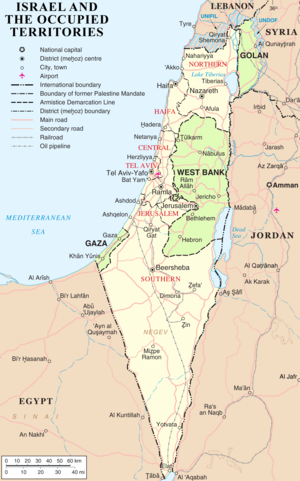Our website is made possible by displaying online advertisements to our visitors.
Please consider supporting us by disabling your ad blocker.
Israeli-occupied territories

Israel has occupied the Golan Heights of Syria and the Palestinian territories since the Six-Day War of 1967. It has previously occupied the Sinai Peninsula of Egypt and southern Lebanon as well. Prior to 1967, control of the Palestinian territories was split between Egypt and Jordan, which occupied the Gaza Strip and the West Bank, respectively. The Israeli occupation of the Palestinian territories and the Golan Heights, where Israel has transferred parts of its population and built large settlements, is the longest military occupation in modern history.
From 1967 to 1981, the four areas were administered under the Israeli Military Governorate, and after the return of the Sinai Peninsula to Egypt after the Egypt–Israel peace treaty, Israel effectively annexed the Golan Heights and East Jerusalem in 1980, and brought the rest of the West Bank and the Gaza Strip under the Israeli Civil Administration.[1]
The International Court of Justice (ICJ),[2] the UN General Assembly,[3] and the UN Security Council all regard Israel as the occupying power for the territories.[4] In 2024, the ICJ ruled in an advisory opinion that Israel's occupation was illegal and called for Israel to end its "unlawful presence ... as rapidly as possible" and to make reparations to the people of the occupied territories.[5][6] UN Special Rapporteur Richard Falk called Israel's occupation "an affront to international law".[7] The Supreme Court of Israel has ruled that Israel is holding the West Bank under "belligerent occupation".[8][9] However, successive Israeli governments have preferred the term "disputed territories" in the case of the West Bank,[10][11] and Israel likewise maintains that the West Bank is disputed territory.[12]
In 2005, Israel unilaterally disengaged from the Gaza Strip, but the UN and a number of human rights organizations continue to consider Israel as the occupying power due to its blockade of the territory;[13][14][15][16][17] Israel rejects this characterization.[18]
Cite error: There are <ref group=lower-alpha> tags or {{efn}} templates on this page, but the references will not show without a {{reflist|group=lower-alpha}} template or {{notelist}} template (see the help page).
- ^ "The situation in the occupied Arab territories" (PDF). Archived (PDF) from the original on 2021-02-27. Retrieved 2018-08-27.
- ^ Cite error: The named reference
International Court of Justicewas invoked but never defined (see the help page). - ^ Cite error: The named reference
http://unispal.un.orgwas invoked but never defined (see the help page). - ^ Strongly deplores the continued refusal of Israel, the occupying Power, to comply with the relevant resolutions of the Security Council and the General Assembly; Ruth Lapidoth; Moshe Hirsch (1994). The Jerusalem Question and Its Resolution: Selected Documents. Martinus Nijhoff Publishers. pp. 351–. ISBN 978-0-7923-2893-3. Retrieved 15 January 2012.
- ^ Cite error: The named reference
Maupaswas invoked but never defined (see the help page). - ^ Cite error: The named reference
Jacobwas invoked but never defined (see the help page). - ^ "Controversial UN expert: If talks fail, Hague should opine on Israel". The Times of Israel. Archived from the original on 2021-05-07. Retrieved 2014-01-06.
- ^ Beit Sourik Village Council v. The Government of Israel Archived 2022-09-13 at the Wayback Machine. (PDF) . Retrieved on April 4, 2017.
- ^ Zarchin, Tomer (July 9, 2012). "Legal Expert: If Israel Isn't Occupying West Bank, It Must Give Up Land Held by IDF". Haaretz. Archived from the original on October 10, 2017. Retrieved March 12, 2017.
'If the Levy Committee is pushing the government to determine that Israel's presence in the West Bank does not violate international law, Israel is in a dangerous position facing the rest of the world,' said Sasson this morning to Haaretz. ... 'For 45 years, different compositions of the High Court of Justice stated again and again that international law applies to the West Bank, which is clearly opposed to Levy's findings. This is a colossal turnaround, which I do not think is within his authority. He can tell the government that he recommends changing legal status, and that's all,' said Sasson.
- ^ FAQ: The Peace process with the Palestinians – Dec 2009 Archived 2022-05-17 at the Wayback Machine. Mfa.gov.il. Retrieved on 2012-01-15.
- ^ From "Occupied Territories" to "Disputed Territories," by Dore Gold Archived 2011-07-09 at the Wayback Machine. Jcpa.org. Retrieved on 2012-01-15.
- ^ "Israel, the Conflict and Peace: Answers to frequently asked questions". Israel Ministry of Foreign Affairs. 2009-12-30. Archived from the original on 2015-02-19. Retrieved 2015-01-24.
- ^ "SPOKESPERSON's DAILY HIGHLIGHTS". United Nations. Archived from the original on 8 May 2012. Retrieved 29 April 2012.
- ^ Cite error: The named reference
AI_briefingwas invoked but never defined (see the help page). - ^ Cite error: The named reference
isrlpa13698was invoked but never defined (see the help page). - ^ Cite error: The named reference
cnn2009-01-06was invoked but never defined (see the help page). - ^ "Israel: 'Disengagement' Will Not End Gaza Occupation". Human Rights Watch. 2004-10-29. Archived from the original on 2015-04-15. Retrieved 11 May 2012.
- ^ "Ambassador Prosor addresses the UN Security Council". Israel Ministry of Foreign Affairs. 2014-07-18. Archived from the original on 2015-02-19. Retrieved 2015-01-24.
Previous Page Next Page
الأراضي التي تحتلها إسرائيل Arabic ইজৰাইলৰ দখলকৃত অঞ্চলসমূহ AS İsrailin işğal etdiyi ərazilər AZ ইসরায়েল-দখলকৃত অঞ্চলসমূহ Bengali/Bangla Území okupovaná Izraelem Czech Israelisch besetzte Gebiete German Israel-okupaciataj teritorioj EO Territorios ocupados por Israel Spanish سرزمینهای اشغالشده توسط اسرائیل FA Territoires occupés par Israël French


